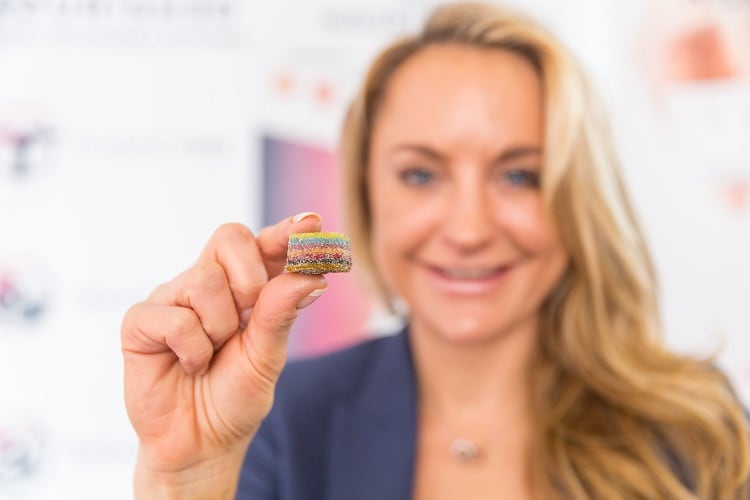Rousselot, a leading global producer of gelatine and collagen peptides, hopes its recent production technology breakthrough will boost innovation and launches of jellies and gummies containing collagen – the so-called ‘miracle’ ingredient hailed to be able to reverse the physical signs of ageing and improve bone, joint and muscle health.
Improving the scalability of collagen gummies
Rousselot recently launched a new gelatin-based technology called SiMoGel, which it showcased at the recent FiE 2019 event in Paris. This technology promises to accelerate the gelation process of gummies.
The traditional gummy production process uses starch molds. Rousselot’s new process replaces starch molds with silicon, or metal molds and blisters. It says this speeds up the production process to under 15 minutes and also allows cross contamination to be avoided.
“The gelatine process was never fast enough,” Rousselot’s Busines Development Manager Innovations Jeff Daelman told FoodNavigator. “The new technology allows functional foods to be scaleable and makes it easier for companies and start-ups to launch collagen gummies.”
Collagen can be used as an ingredient in a wide variety of food and beverage applications including drinks, cereal bars, chocolates, yoghurts and cookies. “Tea is the only thing that is a challenge,” said Daelman. Gummies are a popular method for talking collagen, he explained, because “people don’t like to take pills. Gummies feel less medicinal and more like candy.”
Fountain of youth
Sara De Pelsmaeker, Product and Business Development Manager for Gelatin and Collagen at Rousselot, said that collagen in food and beverages allows manufacturers an opportunity to tap into the personalisation trend among consumers and also the growing desire for functional food and beverages.
“Nowadays people are looking for something that physically makes them feel good and can help improve their body,” she said. “They want food with a function. Food products need to have something extra. Just to have regular food product is not enough any longer."
She explained that collagen is the most abundant protein in your body which decreases with age.
“It’s very important you have enough collagen in your body because a lot of your bones and skin is composed of collagen. That changes over time with ageing. After the age of 35 collagen production slows down, while the breakdown of collagen speeds up. We see that in the skin with wrinkles, lager pores and dehydration of the skin. Where you don't see the college breakdown but feel it is after the age of 40 in your joints.”
Collagen peptides, meanwhile work by being broken down into a smooth, light powder. Its amino acids are then digested, absorbed, and distributed the throughout the entire body.
Collagen peptides purportedly improve skin health, hair strength and bone and joint health. It is also claimed that collagen peptides help athletes perform better by reducing muscle soreness.
“There’s a huge amount of literature on the benefits of collagen peptides: we focus on healthy ageing, sports nutrition, beauty and joint health,” said De Pelsmaeker. "A lot of nutritionists and company's want to help people prevent the development of a lot of diseases by eating healthier. That's something where collagen peptides can help.”




